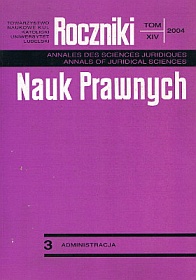Co-operation of Public Administration with Non-governmental Organisations
Abstract
The role of non-governmental organisations in performing tasks on behalf of society was regarded as equal to the role for which an administrative apparatus is established in a state. The tasks here are mentioned in the law on public benefit and voluntary activity; they have been clearly named as the sphere of public administration.
Performing tasks on behalf of the satisfaction of collective public needs belongs to the obligations of administration. The fact that these obligations are fulfilled also by other subjects, irrespective of administration, should make us work out clear principles of co-operation. Such principles and forms of co-operation between argans of public administration and non-governmental organisations were introduced by the law of 24th April 2003, the law on the activity of public benefit and voluntary action. It was passed after many years of work on the regulation of this issue. The law is different from the projects preceding it. It draws on their solutions, such solutions that are conducive to the establishment of non-governmental organisations in the legal order, how they can perform public tasks on behalf of the organs of public administration, and how they can obtain support from the state budget.
The hitherto non-governmental organisations, while performing public tasks, relied on their own funds, often competing with public administration. In the present legal status the positions of these subjects are in balance, and their activity has been transformed into co-operation. Now this co-operation will not have a declarative character and will not rely on any free agreement of the parties.
References
Boć J.: Prawo administracyjne, Wrocław 2000.
Frączak P.: Miejsce organizacji pozarządowych – rozwiązania ustrojowe, „Asocjacje” 1996, nr 4-5, s. 4.
Grzybowski M., Wiśniewski C.: Opinia dotycząca projektu ustawy o działalności pożytku publicznego oraz o zmianie niektórych ustaw, „Asocjacje” 1997, nr 1-2, s. 9-10.
Izdebski H.: Fundacje i stowarzyszenia, Warszawa 1996.
Hrynkiewicz J.: Decentralizacja funkcji społecznych państwa, Warszawa 2001.
Izdebski H., Zieliński J.: Projekt ustawy o działalności pożytku publicznego, Notatnik Legislacyjny. Kancelaria Senatu RP, Warszawa 1996.
Janowski J.: Jaki pożytek dla organizacji, „LOS – Czasopismo Samopomocy Społecznej” 1998, nr 4, s. 23-25.
Marciniak P.: Jednostka – Społeczeństwo – Państwo, „Asocjacje” 1996, nr4-5, s. 7.
Rybka I., Rymsza M.: Polityka państwa wobec organizacji pozarządowych w Polsce, w: Organizacje pozarządowe w społeczeństwie obywatelskim – wyzwanie dla środowisk akademickich, red. A. Juros, Lublin 2002, s. 64-65.
Sawicka P.: Co z ustawą, „Asocjacje” 1996, nr 9, s. 11.
Śpiewak P.: Demokracja w Polsce, „Asocjacje” 1996, nr 4-5, s. 6.
Współpraca administracji rządowej z organizacjami pozarządowymi, Kancelaria Prezesa Rady Ministrów, Warszawa 1998.
Wygnański K.: Trzeci sektor wobec legislacji, „Asocjacje” 1996, nr 8, s. 7.
Copyright (c) 2004 Roczniki Nauk Prawnych

This work is licensed under a Creative Commons Attribution-NonCommercial-NoDerivatives 4.0 International License.


